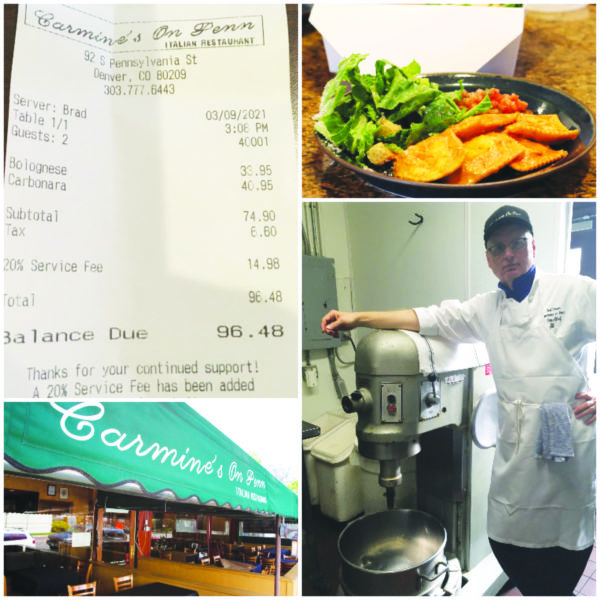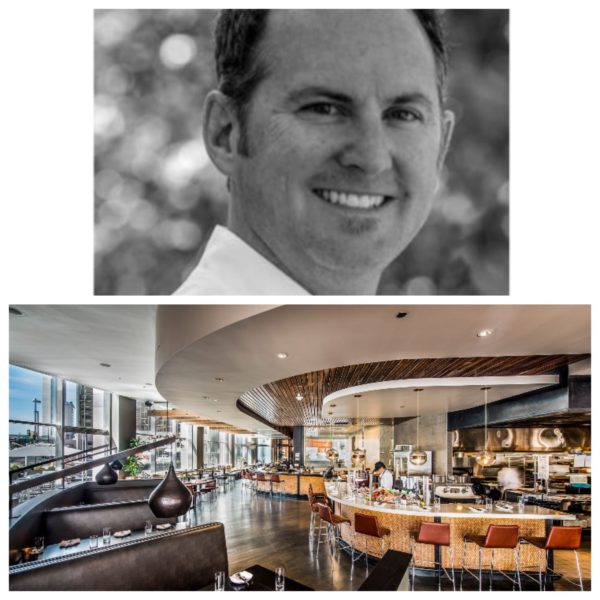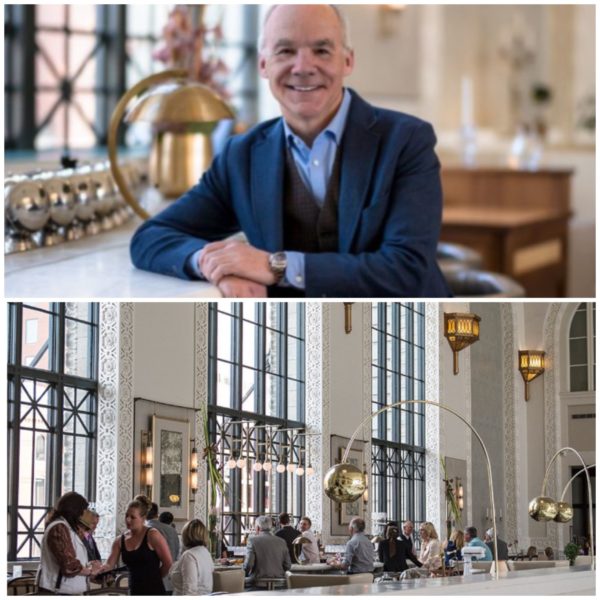
Carmine’s on Penn added a 20 percent service charge, top left, to all checks. Owner Brad Ritter is shown. (Courtesy of Carmine’s on Penn)
Denver restaurants have been grappling with the wage gap between front-of-the-house and back-of-the-house employees for years.
Increasing competition and the rising state and city minimum wage have made it difficult to even out pay between wait staff and those in the kitchen who don’t get tipped, according to those in the industry.
Now, with the pandemic putting local restaurants in a state of almost constant uncertainty, multiple prominent restaurateurs have decided it’s the logical time to debut what they see as a solution — the service charge.
“I’ve been considering this idea for quite some time because the fast-increasing minimum wage was putting pressure on our pay system anyway,” said Brad Ritter, the owner of Carmine’s on Penn. “But since no one knows what to expect one day to the next anyway with the pandemic, we thought now might be a good time.”
The amount of the service charge varies by restaurant. At some spots, it’s 20 percent of the check. At others, it’s 3.5 percent. Some eateries expect diners to leave their usual tips. Others don’t but find customers aren’t always on board.
Minimum wage in the city of Denver increased to $14.77 an hour as of January, and $11.75 an hour for tipped employees. Those figures are slated to increase again in July, to $15 and $11.98.
BusinessDen talked to Ritter, Chef Troy Guard and Gourav Patel of TAG Restaurant Group, and Joe Vostrejs of City Street Investors about the new line item on customers’ receipts.
Although there is a light at the end of the pandemic tunnel thanks to vaccines, some restaurateurs think that these hospitality-included charges “could be the new normal,” Vostrejs said.
Brad Ritter, Carmine’s on Penn
Carmine’s on Penn, which has been open for nearly 30 years at 92 S. Pennsylvania St., added a 20 percent service charge to all checks in June after reopening for dine-in.
The Italian restaurant notes on its menu that it does not accept gratuities, although Ritter said more than half of his customers usually do anyway and the tip line remains. The note also explains that the charge is necessary to maintain the business.
“If I just raised menu prices, that could possibly increase tipping, which would increase the disparity between kitchen staff and non-kitchen staff even more,” Ritter said. “The service charge allows us to put money toward the kitchen staff that’s usually underpaid.”
Ritter said that the charge has allowed him to give everyone in the restaurant a raise. Carmine’s takeout sales have stayed consistent throughout the pandemic, which he said he’s grateful for, given the recent jump from 25 to 50 percent capacity only allowed the restaurant to add six more chairs indoors.
“Until we get to 100 percent, it’s a losing proposition,” he said.
Eventually, after a year or so, Ritter said he’s considering folding the service charge into the menu prices. But for now, he wants to avoid that sticker shock.
Carmine’s will open a second location within LoDo’s McGregor Square in the spring.

Troy Guard of TAG Restaurant Group added a 3.5 percent service charge to checks at his restaurants, including Guard and Grace. (Courtesy of TAG Restaurant Group)
Troy Guard and Gourav Patel, TAG Restaurant Group
TAG Restaurant Group, which was founded by Chef Troy Guard in 2009, owns nine restaurants around Denver, including fine-dining restaurant Guard and Grace and TAG Burger Bar.
Guard said each of his restaurants added a 3.5 percent service charge to all checks in January to “compensate our kitchen team above minimum wage, as well as contend with increased sanitation and supply costs.” Tips are still encouraged.
“We had a target in our head in terms of how much we wanted to increase back-of-the-house employees’ wages,” said Gourav Patel, TAG’s chief financial and operations officer. “We wanted to give kitchen staff $2 to $4 of extra hourly pay, and through a number of modeling scenarios, we landed on this number. After five weeks, each back-of-the-house employee is making on average an extra $3.50 an hour now.”
Guard added that the raise has boosted morale overall in the midst of a labor crisis.
“People still want to eat out. But if this gap keeps growing, it’s going to be harder to find people for the back that make this amazing food,” he said.
The overall response from customers has been positive, according to the restaurateur, and he plans to re-evaluate the system quarterly. Guard said that he wants to avoid raising menu prices.
“It’s a tough business out there,” he said. “Each year, it becomes harder and harder, and I think people’s perception is ‘Why does this chicken or hamburger cost this much more?’ Well, when we closed down in March and reopened in June, half of the food product went up 50 percent, and it was challenging to figure out what we can do. So, if people don’t mind putting more toward the service charge, we can keep our menu value-driven.”

Joe Vostrejs with City Street Investors said restaurants like The Cooper Lounge added a 20 percent service charge to checks. (Courtesy of City Street Investors)
Joe Vostrejs, City Street Investors
City Street Investors, which owns and/or operates multiple Denver restaurant brands, and owns the real estate for others, has applied a service charge at seven of its restaurants.
The charges range from 5 to 20 percent depending on the operation and style of the business. Fine dining restaurants, like The Cooper Lounge in Union Station and Officers Club in Lowry, adopted a 20 percent charge, while more casual restaurants like ACME Delicatessen added 10 percent.
City Street Investors’ restaurants that have added a service charge originally removed the tip line altogether, although Vostrejs said many guests still leave cash or write in a tip themselves.
One restaurant had 25 requests from guests to add the tip line back, despite the additional charge, so Vostrejs said they plan to add it back at all restaurants this week.
“What most people don’t realize is that federal law prohibits tip-sharing amongst the front-of-the-house staff and the back,” Vostrejs said. “We included the service charge in lieu of a voluntary tip so we’re now legally able to distribute the pay among all of the staff in a way that’s much more equitable. Many of our line cooks and what not have seen their pay go up 40 to 50 percent, which has been life changing.”
The City Street Investors founder said he plans for the charges to be permanent.
Elsewhere in the industry
Den Corner Restaurants, which owns three sushi restaurants along Pearl Street in Platt Park — Sushi Den, Izakaya Den and Ototo — has added a 12 percent service charge to all takeout checks, according to its website.
Duo Restaurant in the Highlands also added a 22 percent service charge to all checks in place of a traditional gratuity.
This movement toward service fees and higher menu prices isn’t new. BusinessDen reported in August that Amethyst Coffee, which has three locations in Denver, had decided to raise its prices 50 percent and remove tips in order to pay employees a $50,000 annual salary.
There have also been other efforts by America’s restaurant industry to break the reliance on tipping.
Danny Meyer, of Union Square Hospitality Group in New York City, eliminated tipping at 12 restaurants in 2015.
Last year, however, Meyer reversed course citing the pandemic, saying he didn’t want to deny employees any extra compensation that might be available in a time of economic crisis.

Carmine’s on Penn added a 20 percent service charge, top left, to all checks. Owner Brad Ritter is shown. (Courtesy of Carmine’s on Penn)
Denver restaurants have been grappling with the wage gap between front-of-the-house and back-of-the-house employees for years.
Increasing competition and the rising state and city minimum wage have made it difficult to even out pay between wait staff and those in the kitchen who don’t get tipped, according to those in the industry.
Now, with the pandemic putting local restaurants in a state of almost constant uncertainty, multiple prominent restaurateurs have decided it’s the logical time to debut what they see as a solution — the service charge.
“I’ve been considering this idea for quite some time because the fast-increasing minimum wage was putting pressure on our pay system anyway,” said Brad Ritter, the owner of Carmine’s on Penn. “But since no one knows what to expect one day to the next anyway with the pandemic, we thought now might be a good time.”
The amount of the service charge varies by restaurant. At some spots, it’s 20 percent of the check. At others, it’s 3.5 percent. Some eateries expect diners to leave their usual tips. Others don’t but find customers aren’t always on board.
Minimum wage in the city of Denver increased to $14.77 an hour as of January, and $11.75 an hour for tipped employees. Those figures are slated to increase again in July, to $15 and $11.98.
BusinessDen talked to Ritter, Chef Troy Guard and Gourav Patel of TAG Restaurant Group, and Joe Vostrejs of City Street Investors about the new line item on customers’ receipts.
Although there is a light at the end of the pandemic tunnel thanks to vaccines, some restaurateurs think that these hospitality-included charges “could be the new normal,” Vostrejs said.
Brad Ritter, Carmine’s on Penn
Carmine’s on Penn, which has been open for nearly 30 years at 92 S. Pennsylvania St., added a 20 percent service charge to all checks in June after reopening for dine-in.
The Italian restaurant notes on its menu that it does not accept gratuities, although Ritter said more than half of his customers usually do anyway and the tip line remains. The note also explains that the charge is necessary to maintain the business.
“If I just raised menu prices, that could possibly increase tipping, which would increase the disparity between kitchen staff and non-kitchen staff even more,” Ritter said. “The service charge allows us to put money toward the kitchen staff that’s usually underpaid.”
Ritter said that the charge has allowed him to give everyone in the restaurant a raise. Carmine’s takeout sales have stayed consistent throughout the pandemic, which he said he’s grateful for, given the recent jump from 25 to 50 percent capacity only allowed the restaurant to add six more chairs indoors.
“Until we get to 100 percent, it’s a losing proposition,” he said.
Eventually, after a year or so, Ritter said he’s considering folding the service charge into the menu prices. But for now, he wants to avoid that sticker shock.
Carmine’s will open a second location within LoDo’s McGregor Square in the spring.

Troy Guard of TAG Restaurant Group added a 3.5 percent service charge to checks at his restaurants, including Guard and Grace. (Courtesy of TAG Restaurant Group)
Troy Guard and Gourav Patel, TAG Restaurant Group
TAG Restaurant Group, which was founded by Chef Troy Guard in 2009, owns nine restaurants around Denver, including fine-dining restaurant Guard and Grace and TAG Burger Bar.
Guard said each of his restaurants added a 3.5 percent service charge to all checks in January to “compensate our kitchen team above minimum wage, as well as contend with increased sanitation and supply costs.” Tips are still encouraged.
“We had a target in our head in terms of how much we wanted to increase back-of-the-house employees’ wages,” said Gourav Patel, TAG’s chief financial and operations officer. “We wanted to give kitchen staff $2 to $4 of extra hourly pay, and through a number of modeling scenarios, we landed on this number. After five weeks, each back-of-the-house employee is making on average an extra $3.50 an hour now.”
Guard added that the raise has boosted morale overall in the midst of a labor crisis.
“People still want to eat out. But if this gap keeps growing, it’s going to be harder to find people for the back that make this amazing food,” he said.
The overall response from customers has been positive, according to the restaurateur, and he plans to re-evaluate the system quarterly. Guard said that he wants to avoid raising menu prices.
“It’s a tough business out there,” he said. “Each year, it becomes harder and harder, and I think people’s perception is ‘Why does this chicken or hamburger cost this much more?’ Well, when we closed down in March and reopened in June, half of the food product went up 50 percent, and it was challenging to figure out what we can do. So, if people don’t mind putting more toward the service charge, we can keep our menu value-driven.”

Joe Vostrejs with City Street Investors said restaurants like The Cooper Lounge added a 20 percent service charge to checks. (Courtesy of City Street Investors)
Joe Vostrejs, City Street Investors
City Street Investors, which owns and/or operates multiple Denver restaurant brands, and owns the real estate for others, has applied a service charge at seven of its restaurants.
The charges range from 5 to 20 percent depending on the operation and style of the business. Fine dining restaurants, like The Cooper Lounge in Union Station and Officers Club in Lowry, adopted a 20 percent charge, while more casual restaurants like ACME Delicatessen added 10 percent.
City Street Investors’ restaurants that have added a service charge originally removed the tip line altogether, although Vostrejs said many guests still leave cash or write in a tip themselves.
One restaurant had 25 requests from guests to add the tip line back, despite the additional charge, so Vostrejs said they plan to add it back at all restaurants this week.
“What most people don’t realize is that federal law prohibits tip-sharing amongst the front-of-the-house staff and the back,” Vostrejs said. “We included the service charge in lieu of a voluntary tip so we’re now legally able to distribute the pay among all of the staff in a way that’s much more equitable. Many of our line cooks and what not have seen their pay go up 40 to 50 percent, which has been life changing.”
The City Street Investors founder said he plans for the charges to be permanent.
Elsewhere in the industry
Den Corner Restaurants, which owns three sushi restaurants along Pearl Street in Platt Park — Sushi Den, Izakaya Den and Ototo — has added a 12 percent service charge to all takeout checks, according to its website.
Duo Restaurant in the Highlands also added a 22 percent service charge to all checks in place of a traditional gratuity.
This movement toward service fees and higher menu prices isn’t new. BusinessDen reported in August that Amethyst Coffee, which has three locations in Denver, had decided to raise its prices 50 percent and remove tips in order to pay employees a $50,000 annual salary.
There have also been other efforts by America’s restaurant industry to break the reliance on tipping.
Danny Meyer, of Union Square Hospitality Group in New York City, eliminated tipping at 12 restaurants in 2015.
Last year, however, Meyer reversed course citing the pandemic, saying he didn’t want to deny employees any extra compensation that might be available in a time of economic crisis.

Leave a Reply